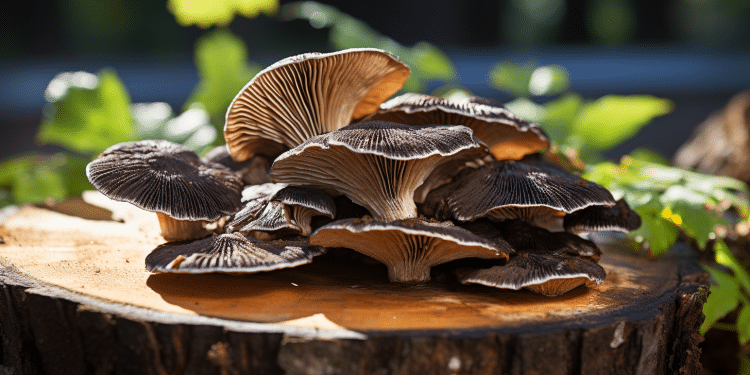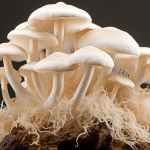Does Turkey Tail Mushroom Help with Lupus?
Yes, turkey tail mushroom may help with the symptoms of lupus. More studies need to be done on the direct effect of turkey tail mushrooms on those with lupus, but due to the ability of turkey tail mushroom to reduce oxidative stress, reduce inflammation, and help with fatigue, turkey tail mushroom may be a great choice for those suffering from lupus.
The benefits of turkey tail mushroom(Trametes versicolor) are mostly attributed to its antioxidant effects, responsible for the reduction of oxidative stress. This effect also helps to lower inflammation in the body. It may also offer benefits in decreasing symptoms like fatigue and pain of Lupus. Finally, it may also help in reducing cancer risk in patients with lupus.
1. Turkey Tail Mushroom May Reduce Oxidative Stress in Lupus Patients
Oxidation-reduction balance within the body is a major aspect of the body that is typically disturbed in patients with Lupus. Redox imbalance leads to oxidative stress, resulting in increased inflammation in the body, which can be corrected with increased antioxidant consumption.
Trametes versicolor has been shown to have powerful antioxidant effects. It acts by removing the free radicals which damage cells within your body. The phenolic compounds present in this mushroom, including quercetin and rutin, are the major elements which gives it its free radical-removal abilities. Turkey tail mushroom is a potent antioxidant. Maintaining an antioxidant balance may aid Lupus patients by reducing unnecessary damage to cells, which can further worsen the state of the disease for those with Lupus.
2. Turkey Tail Mushroom May Reduce Inflammation Caused by Lupus
Inflammation is a defining issue of Lupus, leading to the majority of its symptoms, and making the disease worse over the long term. Turkey tail mushrooms effects on the immune system in the body may make it a great supplement for use in patients with lupus. Reduced inflammation has been seen with use of this fungal-based supplement. Its antioxidant properties are linked to providing an anti-inflammatory effect. Turkey tail is known for acting as anti-inflammatory, by intervening in the body’s normal inflammatory chemical pathways.
It decreases the chemicals which trigger inflammation. The anti-inflammatory effects of turkey tail are supported by scientific studies. However, there needs to be further studies in those with Lupus to establish how much this benefits them directly.
3. Turkey Tail Mushroom May Help Reduce Fatigue in Those With Lupus
Fatigue is one of the symptoms of Lupus which makes it difficult for them to perform everyday activities. Reducing and managing fatigue takes an enormous amount of effort with lupus.
At a pre-research level, anti-fatigue properties have been established as a benefit of turkey tail mushrooms. This effect is an excellent complement to its properties for benefiting Lupus patients. Furthermore, one study which reviewed 20 studies conducted on turkey tail mushroom and described that the mushroom provides anti-fatigue benefits. Some of these studies were on those that had undergone chemotherapy, so it’s not too much of a stretch to think turkey tail could help with Lupus related fatigue.
4. Turkey Tail Mushroom May Reduce Pain in Those With Lupus
Lupus patients experience joint pain as one of their primary symptoms. There is some evidence that turkey tail may be helpful in relieving pain while improving your body’s immune system functions. Animal studies also support this effect on reducing pain through increased anti-inflammatory chemicals released into the body.
The evidence is more tenuous when we talk about studies like these on Lupus patients. Nevertheless, the beneficial effects of the mushroom, as well as its safety profile, could make the mushroom another worthwhile supplement in the treatment of Lupus. As always, consult your doctor before starting to take any new supplement if you’re already on medications, but definitely consider adding turkey tail mushrooms to your daily regimen.
5. Trametes versicolor Can Help in Cancer Prevention in Lupus Patients
Lupus patients are at high risk for developing cancer during their lifetime. They have three or four times the risk of developing cancer compared to those without lupus.
The skyrocketing evidence for the anti-cancer properties of turkey tail claims that the reason behind the effects is due to the presence of polysaccharide K in them. Numerous clinical trials were conducted on cancer patients to establish its benefits, as well as prove that it is safe for use.
More Info on Lupus and It’s Symptoms
Lupus is a medical condition affecting at least five million people worldwide. It is known to come from an immune system malfunction, which destroys the body’s healthy cells. This causes inflammation in the body leading to its symptoms. The symptoms of Lupus are pain and swelling of joints, the appearance of skin eruptions, mouth ulcers, fatigue, weight loss, etc. Lupus may also affect several other body organs such as kidneys, lungs, brain, stomach, heart, eyes, and blood.
It may even cause depression and anxiety in some patients. The primary goal of Lupus treatment is to reduce symptoms and prevent flare-ups using medications such as anti-inflammatory medications, steroids, and others. Researchers have found out that 50% of the patients with lupus in the US are inclined to use complementary and alternative medicine approaches. The lack of complete treatment of the disease has led to an increased usage of a number of complementary and alternative therapies for a better management of the illness.
You can find our favorite capsules, powders, and tincture’s on the following pages of our website and learn more about each individually:
Click to learn more about The Best Turkey Tail Mushroom Supplements
Click to learn more about The Best Turkey Tail Mushroom Powder
Click to learn more about The Best Turkey Tail Mushroom Tincture
Learn more:















